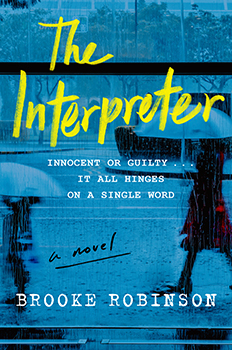

Latest Books The Interpreter with Brooke Robinson
The Big Thrill Sits Down to Discuss THE INTERPRETER with Brooke Robinson
 Innocent or guilty: it all hinges on a single word . . .
Innocent or guilty: it all hinges on a single word . . .
Thanks to a nomadic childhood, Revelle Lee is fluent in ten languages, which she puts to use at crime scenes and in courtrooms across London. Being a court interpreter is a stressful job, one that makes her privy to the most personal and often dark details of others’ lives.
In the meantime, she’s close to adopting a six-year-old boy named Elliot from foster care. Revelle is determined to be the mother she never had, and to make up for a terrible mistake she made years ago. Though the sweet, loving little boy is learning to trust her, she’s begun receiving disturbing messages which she suspects are from his birth family.
When one of her cases involves a murder victim she knew slightly, Revelle fears she’s seeing a miscarriage of justice play out. Putting both the adoption and her career at risk, she deliberately mistranslates a Polish man’s alibi to put his accused friend behind bars, even though he insists he’s innocent.
Revelle thinks she’s gotten away with it free and clear. But someone seems to know what she’s done—and about her long-ago error and its terrible consequences. And they intend to destroy Revelle’s life, piece by piece. . .
Brooke Robinson recently spent time with The Big Thrill discussing her latest legal thriller, THE INTERPRETER.
Can you pinpoint a moment or incident that sparked the idea for this book?
In 2015 I came across an article in The Guardian UK newspaper’s ‘Experience’ column written by an interpreter working in the London criminal justice system. Despite my interest in languages, I’d never given any thought to the work of interpreters before. It had not occurred to me that they translate in the first person, ‘I,’ and for interpreters in the justice system, I learnt that this means speaking for and as murderers, terror suspects, witnesses and victims of violent crimes. For the rest of that day in 2015, I couldn’t stop thinking about what it would feel like to spend your working life speaking as, effectively being someone else, even when that person’s actions went against your sense of right and wrong. I have worked as a playwright, so I know how psychologically difficult it can be for actors to come to the theatre every night and inhabit challenging characters. What then, I wondered, must it be like for the interpreter when their lines, their dialogue, isn’t a fictional story but real life?
A novel is such a major undertaking; there’s the writing of it, of course, then you’re spending months and months revising, polishing, and then promoting it. How did you know this was the book you wanted to spend the next couple of years on?
I knew I wanted to write a novel about an interpreter but I couldn’t settle on a story, so I put the idea in my metaphorical drawer for a number of years until the pandemic hit. Then, the theatre world had ground to a halt, and it wasn’t the most inspiring time to be writing new plays which had been my writing career to date. So, I read everything I could get my hands on about the work of interpreters. I dove deep into the world of forensic linguistics, specifically reading the work of linguists who study how the presence of an interpreter impacts criminal trials and police interviews. Anyone who has ever researched something new for a writing project knows how enjoyable the process can be and how it has the potential to take over your life. At one stage, I was so far down the rabbit hole that I started working towards a creative writing/forensic linguistics PhD with a university.
The more I read about interpreters and their function in our criminal justice system, the more fascinated I was and the more I came to respect people working in this incredibly complex but important field. I read about studies where linguists worked with local police forces to test where in the interview room, when a suspect speaks limited English, should their interpreter be seated. It seems that where the interpreter is physically positioned in the room—beside the person who is being questioned, or across from them—can affect the outcome of a police interrogation. Imagine this person with limited English is being accused of a murder they did not commit, or imagine that they’re guilty. A thing so small as manoeuvring a chair could alter the course of someone’s life.
Were there any particular books, movies, or songs that were knocking around in your head while you were writing this one?
Prisoners written by Aaron Guzikowski, and directed by Denis Villeneuve, is a great film, and the screenplay is a near flawless piece of dramatic writing, in my opinion. Hugh Jackman plays a father in small town America whose daughter is abducted and when he believes local police aren’t doing enough to find her, he’s driven to acts of terrible vigilantism. I’ve long been interested in vigilantes in fiction and it was inevitable, I think, that my first novel would explore these themes.
When you first created your protagonist for this book, did you see an empty space in crime lit that you wanted to fill? What can you share about the inspiration for that character?
Interpreters are essential to the criminal justice system of any multicultural country but they are nearly always invisible in crime fiction. After I read that article in The Guardian newspaper, I did some research and couldn’t believe that no one had written a crime fiction novel about a police interpreter before.
In addition to a great read, what do you hope readers will take away from this story?
I hope monolingual people, such as myself, stop to consider the fascinating role of the language interpreter in civil society and the incredibly important part they play in our justice system. I’m always drawn to themes of vigilantism and hope that readers also think about what they would do if in my protagonist Revelle’s shoes.
What can you share about what you’re working on next?
It’s called The Negotiator and is scheduled for publication in the UK and Commonwealth in June 2024, USA and other countries TBA. It looks at another under-explored profession within policing—the hostage and crisis negotiator. It’s about a police officer, who failed the UK negotiator exam, who gets caught up in a siege while off-duty and finds herself a hostage.
Brooke Robinson is professional playwright who has had her work produced at London’s Vault Festival and the Old Vic, among others. She grew up in Sydney, Australia, and has worked as a bookseller, university administrator, and playwright there and in the UK. She started writing The Interpreter, her first novel, when the pandemic ground the theatre world to a halt, and is currently working on her second novel.
To learn more about the author, please visit her website.
THE INTERPRETER with Brooke Robinson
- LAST GIRL MISSING with K.L. Murphy - July 25, 2024
- CHILD OF DUST with Yigal Zur - July 25, 2024
- THE RAVENWOOD CONSPIRACY with Michael Siverling - July 19, 2024

